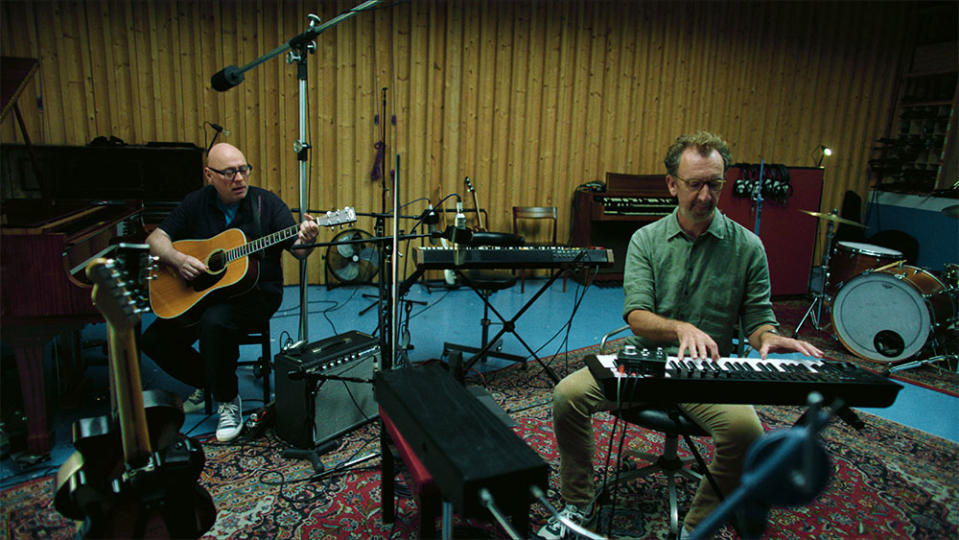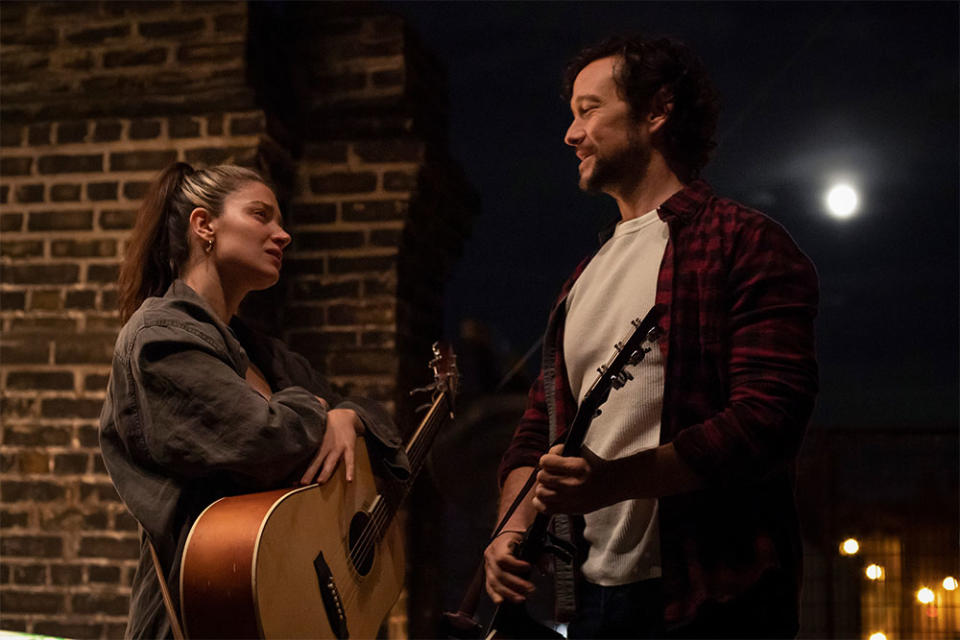‘Flora and Son’ Director John Carney Defends Eve Hewson’s Casting and Explains Why He Won’t Make a Studio Movie

Musicians often have a signature style, and for Irish writer-director-musician John Carney, it only makes sense that his films have one, as well.
Carney’s brand of musical drama usually tells a relatable story about the healing power of music, and his latest film for Apple TV+, Flora and Son, is no exception. As a child in Dublin, Ireland, Carney’s world was forever changed when he was gifted a guitar by his mother, and so he wanted to explore that idea with a single mom named Flora (Eve Hewson) and her troubled teenage son, Max (Orén Kinlan). Flora’s secondhand gift of a guitar doesn’t impress Max in the way that she expected, but she eventually realizes through Joseph Gordon-Levitt’s online guitar teacher, Jeff, that she can still use the instrument to hopefully repair her broken family.
More from The Hollywood Reporter
Joseph Gordon-Levitt Says "Residuals From AI Training Data Should Be Made Mandatory"
Joseph Gordon-Levitt, Shailene Woodley, Richard Madden to Star in 'Killer Heat' Drama
'Poker Face' Showrunners on Putting Natasha Lyonne Through the Wringer With "Gut-Wrenching" Episode
There’s been renewed interest in nepotism throughout the entertainment industry ever since New York Magazine’s December 2022 piece about the “nepo baby,” so Carney fully expected similar commentary involving his lead actor, Eve Hewson, and her father (and U2 frontman), Bono.
“I saw it coming because it’s very easy for people, particularly the internet, to click send, but I don’t think it’s unreasonable for people to ask the question. Nobody arrives at something completely on their own,” Carney tells The Hollywood Reporter.
Nevertheless, Carney believes that Hewson’s background is responsible for her natural instincts as a performer.
“She’s somebody who’s definitely been at some pretty interesting tables in her life,” Carney says. “So she really knows what she’s talking about … and she has great opinions about things. They’re not just borrowed from Twitter or social media; they’re from experience. And I’m sure a big part of her experience is being in the household that she grew up in.”
By making films that are consistently crowd-pleasing to a wide variety of teens and adults, one would think that Carney’s sensibility would lend itself well to the major studio system and its primary effort to reach the widest possible audience. But Carney, whose credits also include Once, Begin Again and Sing Street, is perfectly content to keep making musical dramedies for a small yet global audience.
“I’m a niche filmmaker who’s found his audience, which is quite small. The bigger you get, the dumber it has to get, obviously,” Carney says. “We are many different tribes with many different languages, and for many different people all around the world to enjoy sugar, that sugar has to be one thing. I’m really happy where I am because I get to make stuff that I love and stand by and find quite enjoyable.”
Below, during a recent conversation with THR, Carney also looks back on casting Cillian Murphy in what he considers to be his first lead role and why he’s not at all surprised that he’s now in the Oscar conversation.
Your films often face the same initial challenge of having to come up with both a compelling script and original music that captures an audience in one sitting. Do you spend a lot longer in development since you have to get both right ahead of time?
That is the reason that I’m a bit slow coming up with these films. I also like to try and find a subject matter that is personal to me and that I can talk about for two years. That’s what I’ve got to do, so I don’t ever feel like I’m not personally invested in these stories. And yeah, the marriage of music, once you write the script, you’re not done. You don’t just go straight to casting. You’ve got to go in and figure out what the movie is going to sound like, and obviously, with a musically themed film, that is as important as anything.

I had a cup of coffee in the music industry, and one of the challenges I faced in the recording studio was no longer being able to see the forest for the trees after hearing playback of each song and its individual tracks over and over again. Do you rely on a second set of ears at times when you know you’re too close to a song? Is there an outside perspective that you trust?
Yeah, that’s interesting. Who do I play things to? I think you very quickly get a sense that there are a few people, but nobody specifically. I also think visually, and sometimes, I’ll play a song for somebody who won’t quite get it. But when they see it in the movie, they’re like, “Oh, now I get it.” I could never write as good a song as I would like to think I could, something that’s on a record and stands up on its own two feet. I’m not a good songwriter; I’m a hobbyist. But I can write something as long as I know it has a video or a visual or a story going with it as well. I can get away with it that way.
What set Flora and Son in motion?
The germ of the idea was the gift of music. It’s the idea that it’s not just something that you stumble upon; it’s something that somebody gives you. So it’s a very special gift when somebody does give that to you, and my mother gave me a guitar at a very important time when I was young. It wasn’t that she identified something in me; it was that she invested her hard-earned money in me, and that is a very important part of parenting. We think that if we just spend tons of time with our kids, our genius is going to rub off on them and they’ll be great. But you actually have to decipher their needs and their wants, and you have to work really hard. You have to earn money and provide not only food, but also other things along the way. And sometimes, you don’t. Sometimes, it’s good to push back and say no. But this was one thing that my mother really got right, which was, “I am going to do this for him. I’m going to buy him this guitar.” And it was a lifeline to me. So I was obsessed with that story, and I wanted to dramatize that for very different characters than my mother and myself.

Eve Hewson is incredibly convincing in the role of Flora. Even the way she walks communicates who this character is. Thus, was it frustrating when the early conversation focused on her parentage and not the worthy performance on the screen?
I saw it coming because it’s very easy for people, particularly the internet, to click send, but I don’t think it’s unreasonable for people to ask the question. Nobody arrives at something completely on their own. We’re privileged in different areas, and sometimes, our privilege is our poverty. For example, I got sent to a school that I didn’t want to go to because we were cash-poor at the time. And it ended up being good for me in a way that I would’ve never thought of, but I’m sure my parents didn’t plan it that way. So I think that it’s fine to ask what your parents did or to what degree are you fortunate or lucky or privileged.
But two minutes into seeing Eve do anything, you immediately see that she’s owning this. She’s not depending on anything to get her where she’s going and to get her where she’s at. That’s just obvious. But I think she’s fully aware. I was certainly aware while making the film with her that she’s somebody who’s definitely been at some pretty interesting tables in her life. She’s probably had people coming through the house that are fairly interesting. So she really knows what she’s talking about, and that’s a brilliant thing to have with an actor that you’re working with because it’s very helpful. She’s very instinctual on things, and she has great opinions about things. They’re not just borrowed from Twitter or social media; they’re from experience. And I’m sure a big part of her experience is being in the household that she grew up in.
Joe Gordon-Levitt’s musical ability has been well documented for quite a while through social media and his company, HitRecord, but it’s never shown up in a movie until now. Did you take note of his musical prowess long ago in the event that you ever had a role for him?
No, I did not think of him in relation to this part. I didn’t know that, actually. I mean, I kind of knew through the internet a little bit that there was some singing going on, but I didn’t know how good he was and how interested he was and how much he’s like me, actually. Music is also his other thing, and it was a real revelation to talk to him about music and to connect as parents of young kids. So we have both turned film into our main thing in life, but we are closet musicians in many ways.

No offense to our present perspective, but I really appreciated that you didn’t have us staring at Joe’s character through Zoom the whole movie. So how soon did you land on the right way to move the Jeff character out of Zoom and into Flora’s imagination?
Well, once you’ve established the trust of the audience and once you’ve done something that has drawn them in and made them accept the conditions or the rules of your movie, you have another further obligation, which is to not make it boring. Audiences have a short span of attention. They’re in this dark room for an hour and a half, and you’d better get on with it. So it became very clear after one or two sessions of Zoom on the screen that it would be not just boring, but it would also be a fundamental mistake to just have them onscreen. It wouldn’t feel like a movie. My movie is very small, and that’s kind of the point, but it can’t be so small that you just go on these screens with each other.
So part of the challenge of this movie was to see if I could tell a love story that stuck to the rules and didn’t actually have the characters meet, but maybe they meet in their heads or desire each other in some way, which I think is probably what’s going on when people watch pornography. Presumably, you’re not just watching a cold glass screen; you’re entering into your mind with somebody on a screen that you don’t know. So it’s tragic in a way and lonely, but I guess that’s what’s going on there.
Jeff takes a little bit of a swipe at A Star Is Born. Of course, I want to imagine that you’re being competitive with other musical dramas, but I actually think it’s because the Jeff character sees too much of himself in that movie’s main character, Jackson Maine. Is that correct?
That’s exactly correct. Jeff is a cliché in many ways, and while he doesn’t want to be a cliché, he is. So he’s come up with a way of dealing with that in his life, which is a bit sanctimonious. His relationship with Flora throughout the movie makes him realize a bit of that and that he can be a bit of a mansplainer, because he is fearful of being exposed as a cliché. Jeff was always a symbolic character to me. I didn’t write him as a deeply complex character, but Joe brought a sense of humanity and poignancy to the role that he really didn’t need to, actually. So the film is considerably better off for it, and what’s funny about Jeff’s A Star Is Born comment is that the movie is like A Star Is Born in many ways. It’s not that different.

Your films are always quite crowd-pleasing, so why haven’t you directed a major studio film when their entire objective is to satisfy the widest possible audience?
Because I’m a niche filmmaker who’s found his audience, which is quite small. Globally, it’s now very, very big, but the bigger you get, the dumber it has to get, obviously. We are many different tribes with many different languages, and for many different people all around the world to enjoy sugar, that sugar has to be one thing. We’re not going to all enjoy oysters. We’re not all going to enjoy something that’s a bit rarefied or a bit special. So once you get over a certain number with movies, you have to say, “Hang on a second, this is too broad now. It’s too big.” I’m really happy where I am because I get to make stuff that I love and stand by and find quite enjoyable. So I seem to be able to make a living out of that, and as you say, I seem to make people laugh and have fun and shed a tear and come away from the movie feeling like they’re grateful for the film. So that is a privilege that I don’t take lightly.
Has a song ever hit you as hard as Joni Mitchell’s “Both Sides Now” hits Flora?
Every other day when I was starting to listen to music. Every song on [Stevie Wonder’s] Songs in the Key of Life. Every second song on [Tom Waits’] Closing Time. Every Frank Sinatra song from In the Wee Small Hours. I could list songs all night and all day that have had that same effect, and not just crying, but punching the air and running down the street, or cycling into school on a bike with wings because the song was so good. I was listening to countless examples of that.
You were either the first or second filmmaker to cast Cillian Murphy in a lead role.
The first.
Are you proud of what your countryman has accomplished both this year and the past two decades?
Yeah, Cillian was always a very, very interesting actor. He was in [On the Edge], and I gave that movie to other directors to see him holding down a lead role. So they were able to cast him confidently because he was kind of an unknown quantity back then. So I’m delighted for him. He deserves it. He’s a very, very good actor and a very unusual actor, and he’s a person who, from the minute I met him, was completely and utterly determined. He saw where he was going in a way that was almost psychic, and he had a self-belief and willful determination that I’ve never quite seen in a human being. It was almost that he could see this day where he would get an Oscar nomination for Oppenheimer and everything was going to lead to that day. It was quite something to behold.
***
Flora and Son is now streaming on Apple TV+. This interview was edited for length and clarity.
Best of The Hollywood Reporter

 Yahoo News
Yahoo News 
